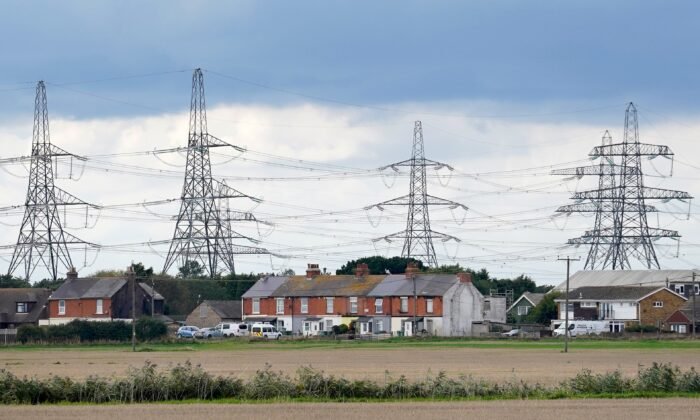National Grid to Secure £7 Billion Investment to Drive Towards Net Zero Goal
Critics argue that the £60 billion Investment plan overlooks reliable nuclear energy and could potentially lead to higher bills or taxes in the long term.
National Grid aims to raise £7 billion from investors as part of a significant net zero spending program over the next five years to decarbonize the electricity network.
On Friday, the multinational electricity and gas utility company, which manages a substantial portion of Britain’s electricity grid, revealed plans to invest about £60 billion in networks by the end of the decade, with over £30 billion allocated to England, Scotland, and Wales.
It announced its intention to raise £7 billion through the issuance of new shares to existing shareholders.
She highlighted that the £30 billion investment over the next five years would generate 55,000 jobs throughout the UK. “A significant vote of confidence in our country,” she added.
Nevertheless, analysts pointed out that “in substance,” this means each job will cost £545,000, with a significant portion of the expense aimed at assisting the grid in managing “unreliable renewables.”
The network is currently undergoing a comprehensive overhaul to link primarily with sources like solar, wind, and batteries. The National Grid’s Electricity System Operator (NGESO) has committed to achieving a zero-carbon power system by 2025.
80 Percent Nuclear Energy
Utility industry analyst Steve Loftus expressed via email to The Epoch Times that such a substantial amount of funds could have been allocated to “reliable nuclear energy.”
“It’s encouraging to see the NGESO raising equity through share sales to fund its grid investments, but the ultimate cost burden will fall on UK consumers, especially when bills are already at record highs,” he remarked.
While acknowledging the necessity of grid upgrades, he highlighted that a significant portion of the expenses are intended to address the challenges posed by “unreliable renewables.”
“The grid was not originally designed to handle the transportation of electricity from numerous scattered locations or from far-off northern regions to the southern areas. This adds an extra cost for consumers due to the net zero mandate that could have been avoided,” Loftus explained.
“The National Grid has set aside £58 billion by 2030 for expanding the grid primarily to accommodate offshore wind. If the UK had prioritized reliable nuclear energy and maintained our domestic capabilities, that £58 billion could have powered the UK with 80 percent nuclear energy, assuming our construction costs were aligned with those in South Korea.”
Grid Provision
Energy analyst Andy Mayer from the Institute of Economic Affairs, a free-market think tank, shared insights via email with The Epoch Times highlighting the significant risks associated with preempting investments in a net-zero grid based on government targets to double capacity and specific targets for various power generation technologies.
Mayer cautioned that if the upcoming government fails to address planning regulations or streamline the consent processes hindering wind, solar, and nuclear power deployment, the additional grid capacity could remain underutilized or be subject to delays.
“If advancements in these technologies occur unpredictably and inconsistently, such as a breakthrough in small modular nuclear technology, the grid provisions may prove to be incorrect or in the wrong locations, resulting in substantial misinvestment. If hydrogen and battery technologies do not decrease in price rapidly enough to make up for renewable energy intermittency affordably, we may still need to rely on gas,” he added.
State-Regulated Monopoly
Mayer noted that the National Grid functions as a state-regulated monopoly overseeing most of the nation’s power grids.
“This wouldn’t be concerning if the National Grid were truly a private entity, risking only its investors’ capital on an ambitious expansion plan. However, since it’s a state-regulated monopoly, any mistakes made can directly impact our bills,” he emphasized.
He indicated that network costs on a standard dual-fuel bill paid via direct debit have surged by 53 percent in the last five years and are expected to rise further to fund these ambitious plans.
“In the short term, this results in higher bills than necessary, while in the long run, it could lead to either significantly increased bills or taxes,” he added.
He highlighted that despite both the government and National Grid touting the creation of 55,000 jobs through these investments, there are hidden costs associated with this claim.
“While this may initially appear positive, in reality, each job will cost £545,000, equivalent to the average annual tax contribution of 60-70 British workers or the operating margin on the bills of 11-16,000 households. These are very costly plans where all the risks are transferred to us, the taxpayers subsidizing the fortunate 55,000 individuals,” he further explained.
Energy Transition
A spokesperson for the National Grid conveyed to The Epoch Times via email, “Our network transmission costs amount to just around £20 of the annual household bill. The £60 billion investment we have unveiled is amortized over a span of 40 years, thus any rise in network costs added to individual bills would be marginal.”
She affirmed that the “investment will ultimately lower bills in the longer run as the infrastructure being developed will connect a greater amount of inexpensive renewable energy to the grid, while also enhancing energy security and helping decarbonize the economy.”
“The slight increase in bills will be offset by new employment opportunities and economic development, with our investment estimated to create an additional 55,000 jobs in the UK by the end of the decade,” she concluded.
The Epoch Times reached out to the Department for Energy Security and Net Zero for their input.
PA Media contributed to this report.





